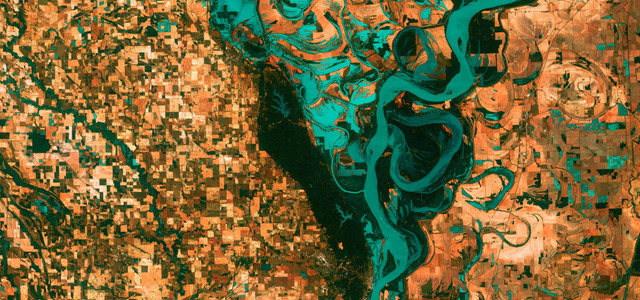These questions were explored at the latest Transboundary Freshwater Security Governance online event, ‘Using data in transboundary water management and negotiations’. The webinar, co-organised by GWP and Oregon State University, is the fourteenth in a series of interactive online sessions now in its third year. Over 110 people from around the world attended on Wednesday 2 November to hear expert insights and discuss the relationship between data and transboundary decision-making.
The event began with two presentations providing an overview of the role of data in transboundary freshwater governance. Aaron Wolf, Professor of Geography at Oregon State University, stressed the importance of data for water conflict management and transformation, noting how a lack of data has sometimes been used to postpone negotiations over shared water use. Aaron also emphasised the need to consider factors that cannot be quantified, such as a water basin’s cultural and spiritual importance. “We have to remember that people are involved in water basins,” he explained. “And often what people do and care about is not measurable. Our job in water diplomacy is to balance data with these human perspectives.”
The need to consider other perspectives was taken up by Lynette de Silva, Director of the Program in Water Conflict Management and Transformation at Oregon State University. She reminded attendees that data is often incomplete and biased. “What is missing from datasets is what is missing from society in general, which is equal representation for nature, marginalised communities, and women,” she said. “This is a problem, because if there are data gaps, the data used in transboundary negotiations is not representative of the population. And when decisions on freshwater do not benefit all groups, it puts the well-being of communities and ecosystems at risk.”
Attendees were then introduced to three freely available water databases. Yelysaveta Demydenko, Knowledge Management Assistant at GWP, gave a tour of the GWP Toolbox Integrated Water Resources Management (IWRM) Action Hub. This interactive knowledge platform brings together tools, resource libraries, case studies, and communities of practice for practical and action-orientated water governance. Users can view country profiles, compare different approaches to water management and connect with water professionals at the Transboundary Water Knowledge Exchange Hub.
The Transboundary Waters Assessment Programme (TWAP) Data Portal was then introduced by Maija Bertule, a Senior Technical Advisor at the UNEP–DHI Centre on Water and Environment. The TWAP Data Portal presents the results of a global assessment of 286 transboundary river basins conducted between 2013 and 2016, still regarded as one of the most comprehensive assessments of its kind. The data and indicators help users understand the dynamics or stressors within basins and to identify countries where more proactive approaches may be needed to solve problems associated with transboundary freshwater.
Melissa McCracken, Assistant Professor of International Environmental Policy at Tufts University, led a tour through the Transboundary Freshwater Diplomacy Database. Hosted by Oregon State University, the database has established itself as a resource for international water cooperation and conflict resolution. Datasets include a spatial database of 312 transboundary river basins, a collection of over 800 international freshwater treaties, and a news archive covering transboundary conflict and cooperation since the late 1940s. All datasets are spatially linked, allowing users to detect trends across the data.
These presentations were followed by a panel discussion led by Zoe Rosenblum, a PhD student in Geography at Oregon State University, and Alexandra Caplan, Transboundary Freshwater Diplomacy Database Manager. Audience questions focussed on the role of social and physical data in negotiations and the decision-making behind the construction and expansion of databases. A series of breakout rooms then allowed attendees to continue these discussions in more detail with the event’s speakers.
As the 90-minute event drew to a close, Aaron Wolf re-emphasised the role of data in transboundary freshwater cooperation. “The amount of data available today is a game changer,” he concluded. “It’s no longer credible for people to use a lack of data as a reason to postpone negotiations. I think this ethic of making data as accessible as possible is really helping to promote dialogue around the world.”
The event was closed by Yumiko Yasuda, GWP’s Senior Network and Transboundary Water Cooperation Specialist, who invited speakers and attendees to continue their discussions at GWP’s Transboundary Water Knowledge Exchange Hub. She also encouraged those interested in the topics covered to enrol in the free Governance for Transboundary Freshwater Security MOOC – a massive open online course, co-produced by GWP and the Global Environment Facility, teaching the skills needed to cooperate in the sustainable management of shared freshwater resources. Subjects covered in the MOOC include international water law, water diplomacy, and sustainable finance, among many others.

